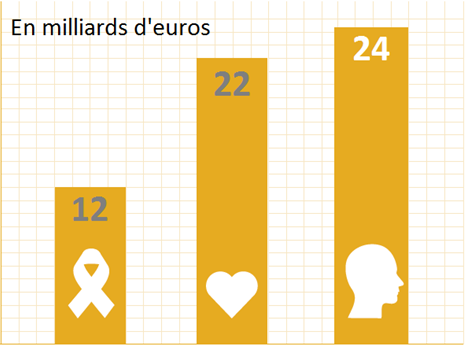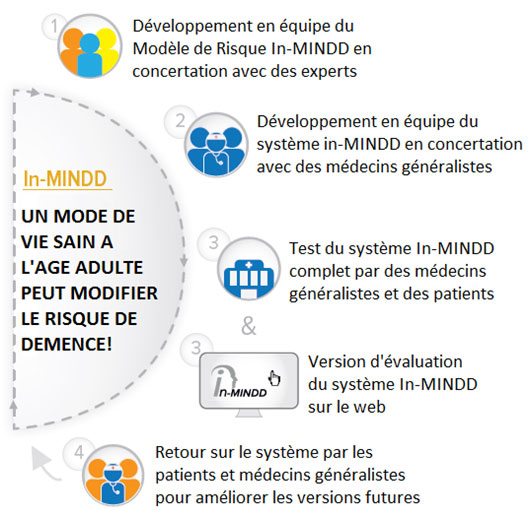IN-MINDD
Innovative Midlife INtervention for Dementia Deterrence
Diminuer le risque de démence et/ou retarder l’apparition de la démence grâce à des changements de style de vie à l’âge adulte.
Résultats – Publications
| Auteurs | Titre | Année | Documents |
|---|---|---|---|
| Promoting modifiable risk factors for dementia: is there a role for general practice? | 2015 |
Qu’est ce que la démence ? Est-ce évitable ?
Le terme « démence » renvoie à des troubles des capacités cognitives, et notamment de la mémoire. Ces troubles sont supérieurs aux difficultés qui peuvent être attendues lors du vieillissement normal, et ont un retentissement dans la vie quotidienne. Bien que la démence ne puisse être guérie, elle peut être évitée ou retardée, en suivant un mode de vie sain à l’âge adulte. La santé et les conditions cardio-vasculaires, le poids, le sommeil et l’humeur sont tous des facteurs de risque de démence modifiables. In-MINDD est un projet européen qui a pour but de développer des outils en ligne pouvant être utilisés par les médecins afin de déterminer le risque de démence de patients adultes, et de mettre en place des stratégies personnalisées de réduction de ce risque. Une partie cruciale de ce projet consistera en des environnements sociaux de soutien en ligne afin d’aider les patients à suivre leurs programmes de réduction de risque, mais reposera aussi sur la diffusion du message que quelque chose peut être fait pour prévenir et/ou retarder l’apparition de la démence, et que le moment d’agir est maintenant.
Que coûte la démence ?
La démence peut être une épreuve terrifiante pour les personnes qui en sont atteintes, car elle crée un sentiment très important d’insécurité au niveau social et génère des réactions émotionnelles négatives. Il existe un haut niveau d’anxiété parmi les adultes et les « jeunes anciens » à propos de leur mémoire. Celui-ci est aggravé par le fait que la dégradation associée à la démence en fait la plus crainte des conditions liées au vieillissement. La démence a également un impact sur les vies de famille et les amis de ceux qui sont affectés par la maladie.
La population d’Europe est vieillissante et, en raison du fait qu’un âge avancé constitue le plus grand facteur de risque de démence, nous faisons face à une épidémie de démence dans les décennies à venir. Globalement, les coûts pour les personnes atteintes de démence s’élèvent à plus de 1% du Produit Intérieur Brut (PIB) – si la démence était un pays, elle représente la 18ème plus importante économie du monde.1 En Europe, le coût total de la démence a été estimé en 2005 à 130 milliards d’euros. La démence coûte à l’économie française 24,2 milliards d’euros par an2, ce qui est plus que le cancer (12 milliards d’euros)3 ou les maladies cardio-vasculaires (22 milliards d’euros)4.

En France, la démence coûte plus que le cancer ou les maladies cardiovasculaires.
Comment In-MINDD va-t-il aider à prévenir la démence ?
La démence à un âge avancé peut être prévenue ou retardée en adoptant un mode de vie sain à l’âge adulte. Il existe certains facteurs de risque qui peuvent être réduits par des changements de mot de vie à l’âge adulte. In-MINDD va développer des outils en ligne, incluant des stratégies pour favoriser l’acceptation du patient, que les prestataires de soins primaires pourront utiliser afin d’aider les patients à réduire leur risque de démence.

Partenaires du projet
In-MINDD est un projet de trois ans, financé par le Septième Programme-Cadre de l’Union Européenne (FP7/2007-2013) sous la convention de subvention No. 304979 (“In MINDD”). Le projet a débuté en novembre 2012.
Pour plus d’informations, veuillez contacter le coordinateur du projet kate.irving@dcu.ie ou dans l’équipe CoBTeK jeremy.bourgeois@unice.fr, ou encore visiter le site www.inmindd.eu
- Wimo and Prince, 2011 World Alzheimer Report 2010 The Global Economic Impact of Dementia. Alzheimer’s Disease International. September 2010.
- http://www.alzheimer-europe.org/Research/European-Collaboration-on-Dementia/Cost-of-dementia/Regional-National-cost-of-illness-estimates/
- http://www.bdsp.ehesp.fr/Base/358204/
- http://www.securite-sociale.fr/IMG/pdf/ccss201006_fic-10-4.pdf
Communiqué de presse de la Conférence In MINDD de Dublin :
European Dementia Research Group
Highlights Way Forward for De mentia Prevention
Fifty dementia experts from across Europe met in Dublin on Thursday 1st and Friday 2nd October to discuss how dementia prevention can translate into national policy. The symposium discussed preliminary findings of In-MINDD (Innovative, Midlife Intervention for Dementia Deterrence), a DCU-led, EU-funded research project that aims to spread the message that action can be taken in midlife to prevent and/or delay dementia onset in future years.
Dementia results in serious memory loss and difficulties with thinking, problem-solving or language, beyond what might be expected from normal ageing, enough to interfere with daily life. In Ireland, the number of people with dementia is estimated at approximately 48,000. The risk of dementia increases with age, and as the population ages, a steady growth in the numbers of people with dementia is forecast, with an expected doubling in the next 20-25 years. Dementia is estimated to cost around €1.69bn per annum (Connolly et al., 2014).
The In-MINDD research group has identified 12 modifiable risk factors for dementia: depression, midlife hypertension, physical inactivity, diabetes, midlife obesity, hyperlipidemia, smoking, drinking, coronary heart disease, renal dysfunction, diet and cognitive activity. Addressing these factors in midlife can lessen the risk of developing dementia in older age. However, the study also identified a low level of understanding of these factors and preventative measures amongst health professionals and the general public.
In-MINDD is focussed on lifestyle assessment, promotion of long-term brain health and dementia prevention/delay. The project partners have developed online tools to assess if a user’s lifestyle supports long term brain health, to devise a personalised strategy for a brain healthy lifestyle and to help the user implement their programme for change.
Dr Kate Irving, co-ordinator of the In-MINDD project said:
“Forecasts for future incidence place dementia among the most significant societal challenges we face, requiring effective policy and program responses and skilled practice to meet evolving needs. Accordingly, it is critical to provide access to data and findings from available research to inform dementia-related policy, planning and practice.
From our research, it is clear to us that integration of dementia prevention into mainstream chronic disease prevention is essential if society and individuals are to benefit from a decrease in the prevalence of dementia. This will require skill and effort from a wide range of stakeholders: researchers, general practitioners, policy makers, community nurses, health promoters and experts from other chronic disease areas, where prevention strategies have achieved success.”
Dr Irving also called for a re-evaluation of current health expenditure on dementia research and services:
“In an economic world, there will always be questions about the distribution of spending in research and services between care, cure and prevention. As the evidence mounts in the case for prevention or delay of dementia and experts agree a cure by 2025 is most unlikely, it is timely to reappraise the evidence and adjust spending ratios accordingly.”
Feedback from Symposium attendees after the event included the following:
“I was very honoured to attend the In-MINDD Symposium last week in Dublin and have taken back to Scotland much learning and much to explore, it was wonderful to meet so many people from across Europe, learn about what they do and importantly meet many inspiring people and build new relationships, thank you Kate and all the team for a great two days.”
Tommy Whitelaw
“I was delighted to attend the in-MINDD symposium on Oct 1-2, 2015 in Dublin. I found the results on prevention on dementia very impressive. I did not know that so much evidence could be gathered in the past 3 years with limited resources. I understand better how the different epidemiological studies intertwine and reinforce each other. I was pleased to see the collaboration with the different teams running intervention studies for dementia prevention in Europe….. A number of questions remain to be solved: how to shift prevention from a clinical issue to a health issue? How to deprofessionalize communication to short messages in plain English intended for the general public? How to use mass media effectively, including social networks? Where to find this sandwich generation which is the target of the prevention communication? How to measure economic impact of prevention? I learned a lot also on the remarkable achievements done at the grassroots level by people-empowered initiatives, such as self-management for chronic diseases.”
Paul-Ariel Kenigsberg
The In-MINDD Project has received funding from the European Union’s Seventh Framework Programme for research, technological development and demonstration under grant agreement no 304979. For further information about the project and/or the Policy Symposium please contact: Dr Kate Irving at DCU (kate.irving@dcu.ie). Please also see the project website: http://www.inmindd.eu/
______________________________
1. Following a successful career in the music industry, Tommy Whitelaw spent five years as full-time carer for his late mother Joan who had Vascular Dementia. His experiences during this period drove him to start an awareness campaign across Scotland’s towns and cities in 2011, collecting hundreds of life story letters from carers detailing the issues they face in caring for a loved one living with dementia. Since then, he has engaged with thousands of carers through his ‘Tommy on Tour’ blog and as Project Engagement Lead of the Health and Social Care Alliance’s Dementia Carer Voices Project, conducting frequent talks to health and social care professionals and carer organisations across Scotland, to raise awareness of the impact of dementia on families and the importance of empowering carers in carrying out their difficult but vital role.
2. Paul-Ariel Kenigsberg, PhD, MBA, is Deputy Manager of the Coordination, Prospective and Strategy unit at the Fondation Médéric Alzheimer. He is chief editor of the national and international Press Review of the Fondation. This knowledge base, unique in its kind, established more than ten years ago, allows prospective watch-keeping of the context of AD in its scientific, medical, technological, social, cultural, professional, political, economic and legal aspects, and spotting of innovative initiatives worldwide. He also leads the prospective expert groups of the Fondation Médéric Alzheimer. His current work focuses on the sensory approach in Alzheimer’s disease and on technologies for people with dementia and their caregivers.
